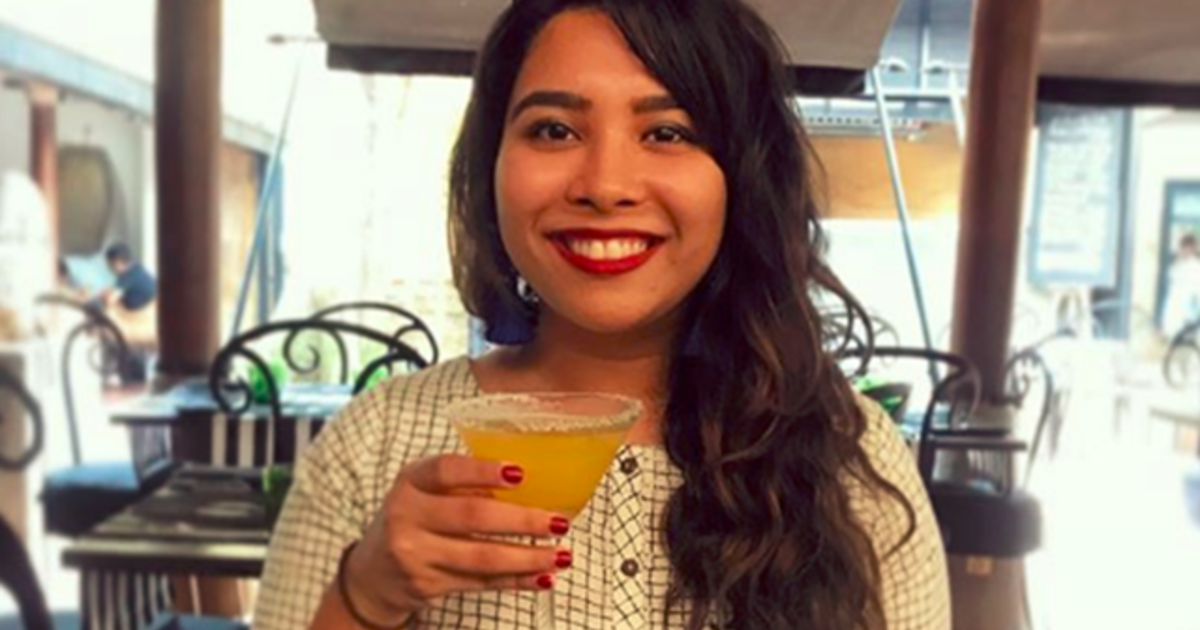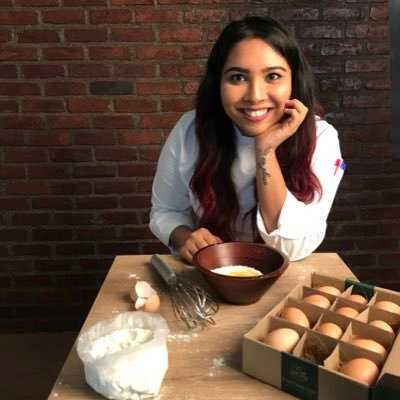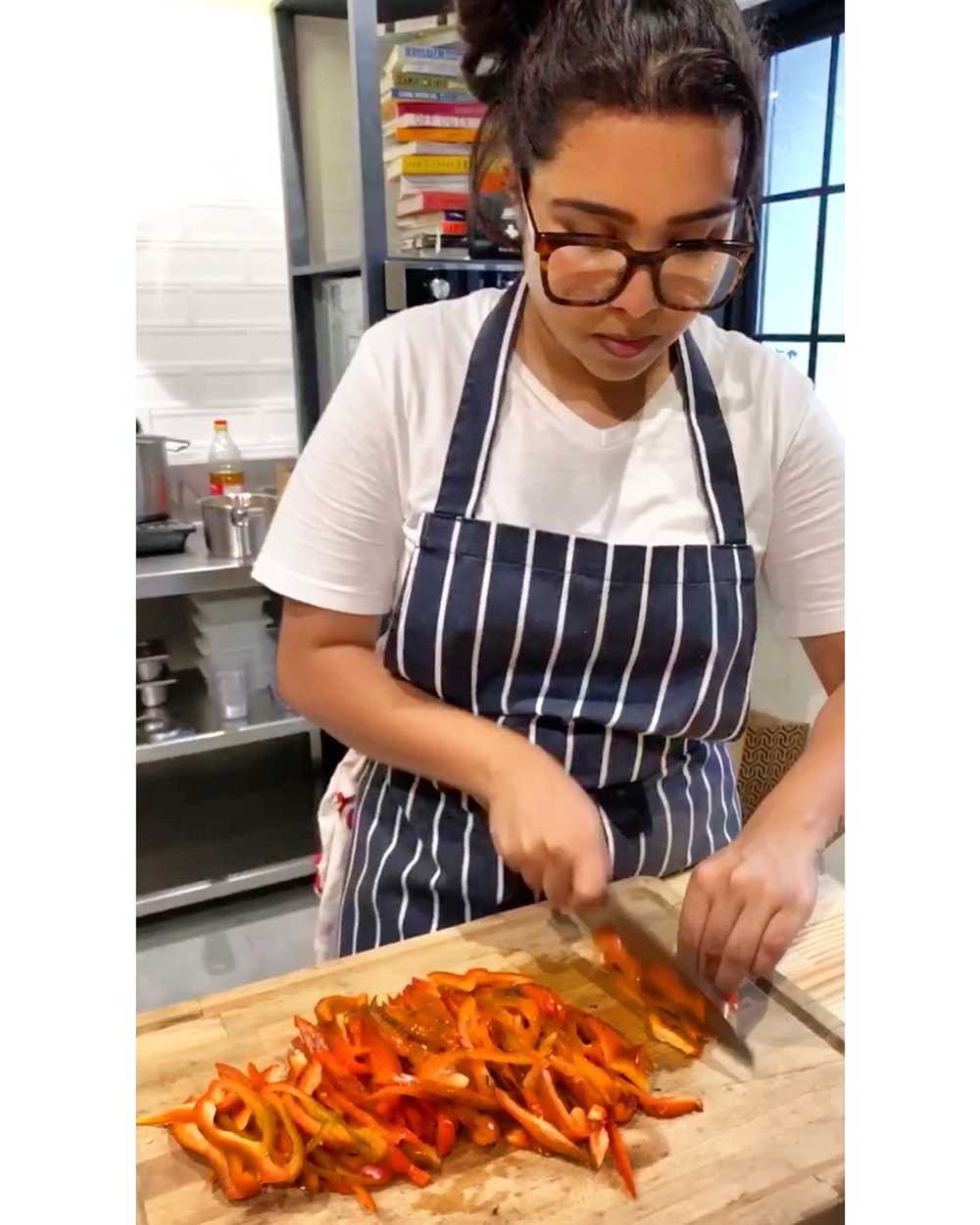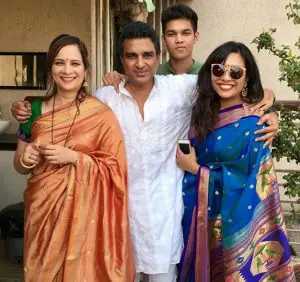From the Kitchen to the World: An Interview with a Trailblazing Female Chef, Devika Manjrekar

Devika Manjrekar is a Mumbai based chef and owner of the famous Toast Pasta Bar. She is a Le Cordon Bleu graduate, who started her own restaurant with an objective of smashing patriarchy and tackling the issue of toxic workplace environment. In this interview with our Editor-in-Chief, Amrita Nair, she discusses her views on mental health, feminism and equality among other things.
Q. A lot of people might have asked you how it feels like to be a female chef and sometimes, it might come off as being offensive. What are your views when people ask you this question?
A. It is true that there are not as many female chefs as there are male chefs, and I’m not offended by any such questions. In fact, if such questions are not asked, we wouldn’t get the viewpoint of women across, making it difficult to understand the challenges women face in the industry. I do feel that it’s been challenging as one must prove that you are as tough as your male counterpart. Apart from being a female chef, being a female entrepreneur, as you can see, includes dealing with lawmakers which is difficult because they think that it is your dad’s venture. Also, it is hard for them to accept that a young girl oversees and manages things. I have stopped getting angry about it and have figured out a way to deal with it. Now, I confidently tell such people how things are through my working style and that's how it is. I have seen a lot of people being surprised that I am the owner and the head chef here as well. Moreover, my restaurant is very different from other restaurants in the city because it’s owned by a female who is also the head chef and is not just involved in pastry shops, but is running a kitchen with a bar and eatery.
Q. After hearing a lot of people talk about female-specific cuisine, in a way that women are capable of dealing with/cooking only bakery products, is there generally a fear to start in a domain other than a pastry shop or a cake shop?
A. Well, I haven’t heard anyone saying this but what I assume is that they (female chefs) are just led to believe that pastry is where their skill would lie. And that’s what they kind of end up doing because it’s usually told to them that a hotel kitchen would be a very intimidating and male-dominated workplace. On the other hand, you can see more women in the pastry kitchen making it appear that women will feel comfortable working there. So, I think they don’t even consider working in the hotel kitchen or similar places. But for me from the very beginning, it’s more about food than pastry and I train people for both, but it’s more like cooking in the bakery.
Q. I have seen the name of your Instagram handle, @devikambing,- did Monica (of the F.R.I.E.N.D.S fame) have a big role to play in your decision to become a chef?
A. Very small part because I don’t think that I was inspired by her to become a chef. It was more of just a coincidence that Monica and I do the same thing for a living. But let me confess, I am very obsessed with Chandler and he is my dream man. Surprisingly, devikambing started like a little embarrassing thing because my actual surname was not mentioned on social media, making people startled and asking me questions like, ‘Where are you from?’ and ‘Are you from India ?’. So I thought professionally it is getting a little bit embarrassing to tell people that it’s actually because of Chandler so I thought of keeping my original last name.
Q. But F.R.I.E.N.D.S was a show where you see Monica as an intimidating woman, being herself, and that sort of broke the stereotypes that women are timid. She was also seen doing a lot of cooking but the same was shown in a somewhat negative light. What do you think, as you have been a cook, that women need to be a bit assertive to get respect or is it just a myth?
I don’t think that any boss needs to be assertive and it’s not a woman or a man thing because if I were just a person who yelled at people to demand their respect it wouldn’t be right. So, a woman being assertive is just as important as a boss being assertive in order to prevent people from walking all over the rules.
Q. What about your interactions with your male colleagues? Do you have some gender-based criteria when you recruit people for your restaurant?
Most of my colleagues are women and I am very particular about that. As I am a woman, I want as many women to be a chef. Most of them are young and I am the eldest of them at 28 years. We are a very young and passionate group of people. If they can do a better job as compared to their male counterparts, I will always give preference to a female resume over a male resume, meaning, I would rather hire a female. Some of them are the ones who have left their jobs as they didn’t like the environment and I strive to address issues relating to sexism and toxic work culture.
Q. As you have brought up the topic of a toxic and difficult work environment, have you previously worked at a place which has toxicity or what exactly has motivated you to create a sense of community at your workplace?
I have worked at a few places in Bombay. Some were ok and some were not the best but some of them I hated I quit them soon after I was told that I needed to toughen up because that’s how kitchens work. But it doesn’t make sense to me. I had to change and convince people that it’s not like that, I will change the way it is by having a happy environment where everyone comes and works and doesn’t feel some burden upon them. I promote a hassle-free environment by having two days off, which is a rare thing, and an eight-hour shift.
Q. As you have a predominantly female staff, how do the males working here feel?
While conducting their interview, if I feel that the male candidate is a masochist and not listening to what I am saying or will not fit into this environment as they are fit for a male taskmaster, I do not hire them. We have male chefs who get this message across and don’t think that they know more than what I do. So far I have been really lucky to have all such boys here. We also tell them before they join the importance of having a safe working environment, to make sure that everyone is comfortable. I don't want anyone making lewd comments. Joking is all right, but no inappropriate things are tolerated. They're all very good friends now.
Q. What about the training on sexual harassment?
So, there is no specific training because we mostly have women chefs. We haven't had the need to talk to the women about it as much, but if I notice something even slightly inappropriate - because we do have male cleaners and pot washers - we also teach them how to always say 'excuse me' and 'sorry' and not to scrape past a girl. I always make it a point to ask the women if they were comfortable with that because I am personally very sensitive to that. Because we are all women, we are aware of this, and it usually does not get overlooked. No boys have so far been inappropriate, but if we think anything is slightly amiss, we deal with it at that point.
Q. What are your views on paid period leaves?
In an ideal world, I wish there were period leaves for everyone who identifies as a woman. I know some females whose periods aren't as bad as other people, but with some people who really suffer, it really is a matter of concern. With the current post-covid time, it is so tough to find staff anyway and we have a very small team, so I'm talking about this with reference to me. But I do have calls when someone says their cramps are really bad, asking if they could get an off, and when I know this person is known to be genuine - I give them the day off and ask someone else to cover for them. But knowing that they have certain days off in the month for that, it is very tough to make sure that is authentic. In an ideal world, I would like it to exist as a concept, but I just don't know how to verify it.
In theory, it sounds like something we should definitely do, but implementation still needs to be figured out.
Q. You've been very vocal about mental health issues on your social media account. How did you start getting passionate about speaking up, and creating awareness about these issues?
I have always been a very anxious child, so it wasn't surprising that I was diagnosed with an anxiety disorder. The depression came in a lot later, at around 18 when I had my first full-blown depressive period. Because it was so bad, I knew I never wanted to feel like that again. So, after therapy and medication, once I was better, I realised that workwise, the stress can make it so much worse. As a student, when you are not responsible for any other things apart from studying, missing school for one day is still okay but not going to work one day when you own a restaurant is a little difficult.
Also, I am surrounded by a lot of anxious people (I think I attract anxious people), and just the fact that this needs to be made okay, when I have people who are having bad days and I know they're feeling anxious, I ask them to sit down and breathe for a while because it can get so overwhelming. When someone is so creatively involved in things, I can tell that their mind is working overtime so the chances of them getting anxious or depressed are way higher. I just need them to know that it’s okay, we can discuss this not as something that's wrong with your behaviour, but as something that you are going through, and we can deal with it together. It needs to be normalised otherwise it is taken lightly. I have high-functioning anxiety and I can put it aside and no one will come to know, but sometimes one gets so tired of putting on that face. So, you need to openly converse about it and know that it’s okay. It's not something that you need to hide or be scared of. This made me speak up on social media platform, to initiate a conversation surrounding mental health issues, in an attempt to make people realise that it is okay to not be okay and to seek help for the same.
Q. How difficult was it for you to have this conversation with your parents?
Actually, it wasn't difficult at all. My mother was the one who said that I probably have anxiety because it is sort of hereditary. Thankfully, it was very easy for me to talk to my parents about it. They were very open with me and encouraged me to go for therapy. There is still a generational gap, when I keep saying it’s the anxiety - they say everything can't be that.
Q. What about your friends, and support system? Have they been understanding of your mood swings, and you avoiding social interactions?
Because it's high-functioning, I have very rarely shown my friends this side of me. My co-workers know more about it than my friends because I meet my co-workers more often. And since I don't meet my friends so often, they don't have to deal with me even though they know about it as I've always spoken about it freely with them. Some of my friends are also anxious people, some are also taking therapy. I'm more open with them in sharing the fact that I can't join them because I cannot get out of bed. Fortunately, most of the time, it hasn't affected my friendships as such.
Q. In India specifically, it has been very difficult to have conversations about mental health with our parents, and a lot of parents off late, due to the advent of social media, have at least acknowledged the fact that it does exist. What would you suggest parents do, to make it a conducive environment for children to come up to them and freely speak about it?
I think they just have to read and know that it's not fake, or not a pretence. Something like this exists. Once they know it exists, at least if their child comes up to them, they might be more open to it. I think our generation will be a lot more open to this. Letting them know that it’s okay, and nothing to fear. It is an illness and parents can tell their children that it's not something that they will have to deal with alone because that is the scariest part.
Some of my friends have told their parents, and they've disregarded it by saying 'No, there is nothing wrong with you. You are not mentally ill, you're not mad or insane, so why should we take you to the therapist?'
I also think it’s a privilege of course, with being financially independent - which lets you make these decisions without relying on your parents. If you are going for therapy or seeing a psychiatrist with your own money, it’s obviously a privilege and not everyone has that. But for people who can do it on their own, I think it makes a huge difference.
Q. A lot of people with mental health issues live in denial and it gets very difficult. What would you tell them? because I think owning their truth is a narrative that very few can afford to do. What would be your word of advice to someone who fears talking about these issues, even though they have accepted it?
There will naturally come a time when they will not be scared anymore because when you first realise it, it's very scary. But as you find out that there are more and more people with this condition, you become more comfortable with talking about it - whether with a therapist or friends, if not parents. Give yourself the time and don't pressurise yourself to be vocal about it. Just do what feels comfortable and take it at your own pace. Don't put pressure on yourself.
Q. Before you started speaking about these issues, the first time when you actually wrote about it, what was going on in your head? Were you scared about what people's reactions would be?
Not really, it was a bit of 'oh shit, she has this and we never knew' and I thought that would be a thing. I had posted about it on World Mental Health Day, and I knew a few friends of mine would not have known about this. That was the only concern, of my friends being a little scared of dealing with me. Apart from that, I have generally been a very headstrong person who does not let it affect her.
Q. Did the behaviour of your friends change, once they knew something like this was going on? Because sometimes a lot of our behaviours start to make sense when the other person knows.
The closest friends of mine, who had to deal with my mood swings, already knew about it. The other ones, because I have never shown it to them, were confused as to what I went through. They had never known me like this. I also had this phase where I would put on a face for the world and stay at home. I don't do it anymore.
Q. Did you feel that sharing it with the world made it much easier for you, instead of just keeping it to yourself?
I also think it was a little unfair because you know how social media impacts people in general, whether it's younger girls or people who look up to you. I don't want them to think my life is just the way it looks on Instagram. Because sometimes when I am posting about my life, I can see that it has not been such a good day but it looks like a great day online. And that's not fair because it puts pressure on other people, thinking like 'her life is so chill, why am I not like that?' Just so that they know this is also a part of it because it's not fair to look at these ideal versions of people's lives and feel bad about yourself. It just felt hypocritical to not share this aspect as well.
Q. Do you identify as a Feminist, and have there been instances where you felt like you could not tell the person that you're a Feminist (If you do identify as one)?
I do. I don't do this thing where I go around and say that 'Hey, I'm a Feminist'. I just put it across through my conversations. I am a feminist in my thoughts and behaviour, but I don't know if it qualifies as using this statement to intimidate someone, mostly males. I talk about it without having to state it.
Q. You are one of the few chefs who have their own restaurants, and like you said, what makes Toast Pasta Bar unique is that you are the head chef as well. Your interactions with others have been as such, and it takes a while to process that a woman is running the show on her own and owning her own business. What message would you like to tell women who want to take this leap, but are somehow, hesitant because the world around them is predominantly male-dominated, and this is in a way intimidating? What would your word of advice be?
My word of advice would be - firstly, have faith in yourself and don't let people convince you that your feelings aren't valid. Secondly, if you think something is wrong, maintain that it is wrong, and don't give in. I know not everyone has the privilege to do that, but still, if you think something is wrong or someone has been inappropriate, just take that stand if you are able to, and find likeminded people in the industry. It will be niche, they'll be a few and less popular, but there will be people who will understand what you've been through, and who are working towards the same cause. Especially now, when there are many more women than when I started out.
Q. Who has been your biggest support system, and your inspiration?
My biggest support system is my parents, without a doubt. Even now, they come every alternate day just to check in on me. I can always discuss anything with them about what's going wrong. Inspiration is this chef that I worked with in London, called Sabrina Gidda. She was the head chef, at 30, at an Italian restaurant in London, and she is of Indian origin. For me, that was super impressive, and that's what I wanted to be. My goal was always to own a restaurant in Bombay before the age of 30 and I needed to do it. Also, to keep your femininity and not lose it just because you are in a male-dominated industry. I still apply lipstick and wear earrings, and it does not interfere with my cooking. You do not have to look like one of the guys, own your femininity.


